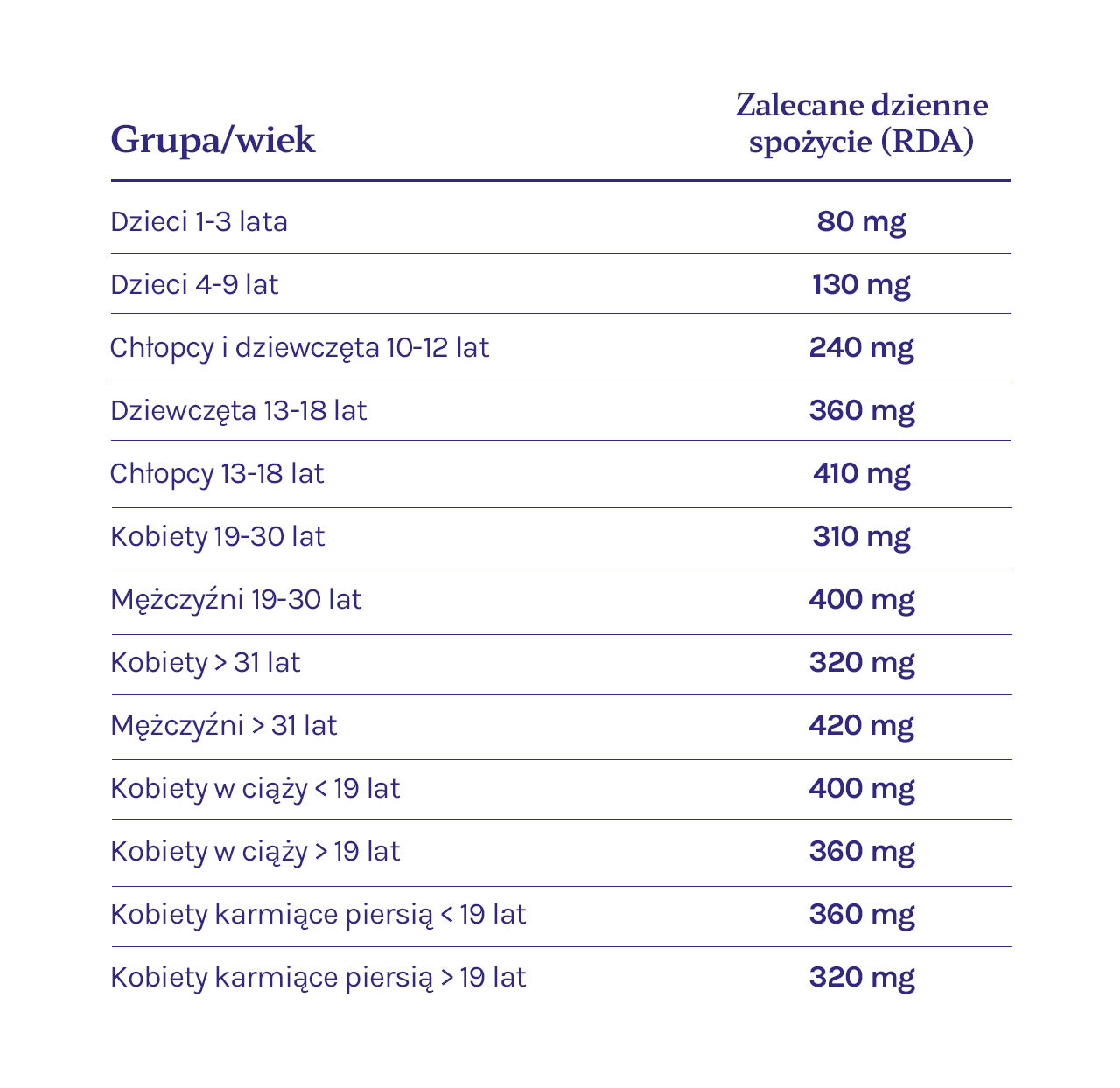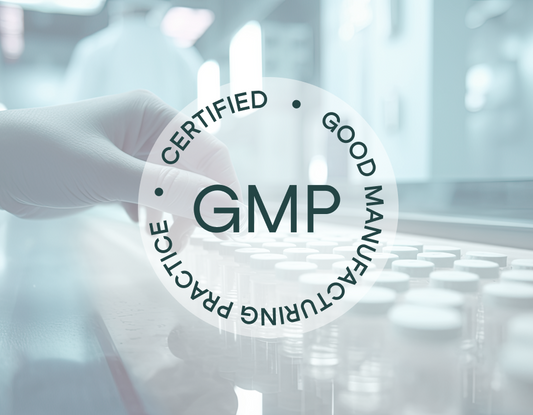
Fatigue, headaches, insulin resistance - these ailments may be related to magnesium deficiency. Find out why the diet does not always provide the necessary amount of this important ingredient, and find out who and when should consider magnesium supplementation.
At the same time, data from the National Institute of Public Health show that we consume too little magnesium. This problem affects over 90% of men and almost 70% of women in Poland. Interestingly, in this respect we may even be ahead of Americans, where only every second person consumes less magnesium than recommended 4 , and Australians, where every third person is deficient in magnesium 5 .
Why is magnesium so important?
The adult human body contains about 25 grams of magnesium, of which about 60% is found in bones, almost 40% in muscles and organs (heart, brain, liver) 6 . Only 1% of magnesium circulates in the blood. And this is the reason why a blood test for magnesium content is not a good way to recognize a deficiency of this nutrient (you will learn about which method is better later in the article).
What exactly does magnesium affect? Among the hundreds of functions, the following can be distinguished:
- takes part in proper cell division;
- participates in the construction of proteins, DNA and RNA 7 ;
- supports the process of getting rid of toxins and supports the liver 8 ;
- helps produce energy in cells, as well as store and transport it 9 ;
- affects the transmission of signals between neurons 10 ;
- supports brain health 11 ;
- helps regulate blood pressure and heart function 12 ;
- affects bowel movements and may facilitate defecation 13 ;
- “activates” the action of vitamin D in the body 14 ;
- participates in the regulation of blood glucose levels 15 ;
- helps maintain the health of bones 16 and teeth 17 .
Magnesium deficiencies are associated with diseases such as migraine headaches, Alzheimer's disease, strokes, hypertension, cardiovascular diseases, type 2 diabetes, stomach and colon cancer and many others 18 . It is worth supplementing this ingredient before serious ailments occur.
How much magnesium do you need every day?
The need for magnesium is different for each of us and depends on age, body weight, gender and the period of life we are currently going through (e.g. pregnancy, breastfeeding, menopause). It is estimated that each additional kilogram of body during growth requires 300 mg of magnesium, and each kilogram of muscle - 200 mg 19 .
Pregnant women also need more magnesium due to the development of the fetus and placenta, increasing body weight and increased urinary excretion of magnesium 20 .
As for the recommended daily intake of magnesium, they vary from country to country. The Polish Institute of Public Health 21 recommends the following amounts of this mineral in the diet:

In practice, each of the groups presented above consumes less magnesium than recommended 22 . Why is it like that? Let's check.
Isn't diet alone enough to provide the necessary dose of magnesium?
On the one hand, there are many foods that are rich sources of magnesium and can help meet the body's need for this important nutrient. Here are a few of them:
- Seeds and nuts . Pumpkin seeds, sunflower seeds, cashews and almonds are especially rich in magnesium. Adding them to your daily diet can be a great way to increase your magnesium intake.
- Green leafy vegetables. Spinach, kale, arugula and lettuce are examples of leafy vegetables that are good sources of magnesium. They can be consumed in the form of salads, green cocktails, and added to various dishes.
- Dark, whole-grain cereal products . Whole grain bread, oatmeal, brown rice and whole grain pasta are rich in magnesium. By choosing these products instead of processed white flour, you can increase your dietary intake of magnesium.
- Fishes and seafood. Some types of fish, such as salmon, mackerel and sardines, are good sources of magnesium. Additionally, seafood such as shrimp and clams also provide this nutrient.
- Dark chocolate . Good news for chocolate lovers - dark chocolate is not only a tasty treat, but also contains magnesium. By choosing chocolate with a high cocoa content, we can enjoy not only the taste, but also the health benefits.
On the other hand, practice shows that diet alone is often not enough to provide us with an adequate dose of magnesium. There are several factors that contribute to this deficiency.
Less and less magnesium in products.
It is estimated that the magnesium content in various food products and vegetables may be lower by up to 80% compared to the levels before 195023 ! Modern farming methods have resulted in the loss of a significant amount of magnesium in food products. Vegetables, fruits, grains and nuts that were once rich sources of magnesium now contain much less of it.
Reduced absorption.
We absorb about 50% of this valuable mineral from food products 24 . Nuts, seeds and cereals contain the so-called anti-nutritional substances, e.g. phytic acid, which hinder the absorption of magnesium.
Improper diet.
Consumption of processed foods and carbonated drinks also contribute to magnesium deficiency. These products are low in magnesium and at the same time increase its excretion from the body. Additionally, the presence of e.g. phosphates in products (stabilizers, acidity regulators) interferes with its absorption.
Stress, stimulants, diseases.
Factors such as stress, excessive alcohol consumption and certain diseases can increase the need for magnesium, making it difficult to obtain the appropriate amount from the diet.
To sum up, eating and absorbing the right amount of magnesium from your diet is not that easy. For this purpose you would need to eat every day (taking into account an average of 50% absorption):
- 3 cups of pumpkin seeds,
- or 1kg mackerel,
- or 0.8 kg of spinach,
- or 10 bars of dark chocolate 70-85%.
How to recognize magnesium deficiency?
Due to the fact that most of the body's magnesium resources are located in tissues and bones, as well as inside cells, laboratory diagnosis of this nutrient deficiency is quite a challenge. Only 1% of magnesium circulates in our blood, and its concentration is constantly maintained at the necessary level, even at the expense of bones and muscles. Therefore, a blood test result for magnesium that is within the laboratory norm is not a guarantee that we have enough of this mineral in the body 25 .
Sometimes it is also recommended to test the concentration of magnesium in urine - in a morning or daily sample. However, this method also has many disadvantages and does not provide 100% certainty that we do not have deficiencies. And although a daily urine sample may provide more information about what is happening in the body, it is worth remembering that the amount of magnesium excreted depends on many factors - age, gender, diseases, hormone levels in the body, medications taken, etc. For example: if we have too much magnesium, the kidneys may excrete larger amounts of it, that's true. If we are deficient, the body retains magnesium. However, both higher and lower urinary excretion of magnesium may also be caused by diseases and do not reflect the resources of this mineral in the body 26 .
An accessible and quite reliable way for everyone to assess whether we are magnesium deficient is to look at the symptoms we experience. The more points from the list below you observe in yourself, the higher the probability that you need more magnesium:
- Frequent muscle spasms, such as eyelid twitching or calf cramps, especially at night.
- Difficulty falling asleep, restless sleep and frequent waking up at night.
- Quick fatigue during physical exercise.
- Digestive difficulties such as constipation, diarrhea, flatulence.
- Headaches and migraines.
- Nervousness, anxiety and irritability.
- Intolerance of stress and difficulties in coping with it.
- Low mood, apathy, and depression may be symptoms of magnesium deficiency.
- Palpitations or irregular heartbeat.
- High blood pressure.
- Lack of energy and feeling of chronic fatigue.
- Problems with concentration and memory.
- Weakened immune system, frequent infections.
- Brittle bones or teeth.
- Bruxism, teeth grinding at night.
- Increased skin sensitivity.
Some chronic conditions may also mean that your body needs more than the standard recommended amount of magnesium.
- Diabetes 27 . People with diabetes excrete more magnesium in their urine due to high blood glucose levels. Magnesium plays an important role in glucose metabolism and insulin resistance, so people with diabetes may need more magnesium.
- Heart diseases 28 . Magnesium plays a key role in regulating heart rhythm, stabilizing blood pressure and protecting against oxidative stress, which is the basis for the development of cardiovascular diseases.
- Kidney diseases 29 . They may lead to increased loss of magnesium in the urine.
- Celiac disease 30 , Crohn's disease and other intestinal ailments 31 . People with these problems may have difficulty absorbing magnesium from the intestines.
- Stress and depression 32 . High levels of stress lead to greater excretion of magnesium from the body, and magnesium deficiency may contribute to the severity of depression symptoms.
Of course, this is not a closed list. If you are unsure whether your condition may be affecting your magnesium needs, consult a trusted doctor.
Magnesium supplementation: what to pay attention to?
Obtaining the necessary amount of magnesium from food is not that easy, and our lives are full of factors that can both promote the leaching of our magnesium stores and interfere with its absorption. Therefore, it is worth supplementing with a magnesium preparation, remembering, however, that not all jars are the same.
Form matters.
Magnesium comes in many forms in popular dietary supplements, for example:
- Magnesium oxide and bicarbonate . These are cheap and poorly digestible forms popularly used by manufacturers. Magnesium in this form can only be absorbed by 4-16% 33 . Taking inorganic forms of magnesium also causes diarrhea more often than other forms 34 .
- Magnesium chelate. It is the form in which magnesium is bound to amino acids such as glycine, taurine or threonine. These are quite easily digestible forms. This group appropriately includes magnesium glycinate, magnesium taurate, magnesium threonate and other forms.
- Magnesium citrate. This is the top form of magnesium. Magnesium citrate is well absorbed by the body and is easily absorbed, up to 90% 35 . It may be a good option for people with a sensitive digestive system because it gently regulates intestinal peristalsis.
When choosing a preparation with magnesium, it is better to trust absorbable forms, even though they may be more expensive. Additionally, it is also worth checking whether the composition includes vitamin B6. It helps magnesium penetrate cells and use it more effectively, reducing urinary excretion 36 .
Capsule or tablet?
Magnesium is absorbed in the small intestine, so it is worth ensuring that its "coating" delivers the active ingredient to the target site. There is an acidic environment in the stomach, so ordinary capsules and tablets may be destroyed by hydrochloric acid, and valuable magnesium will not have a chance to be properly absorbed. There are capsules available on the market whose contents reach the small intestine (e.g. DRCaps technology ).
Harmful supporting ingredients.
And the last, but equally important element, are unnecessary accessories. In addition to magnesium itself, popular preparations often contain fillers, preservatives, dyes, allergens, etc. Such ingredients not only unnecessarily burden the body, but can also irritate the small intestine and even impair the absorption of nutrients, including magnesium itself. You can read more about harmful ingredients that can be found in dietary supplements and which should be avoided in this article . When buying magnesium, make sure that the composition of the preparation is as short and understandable as possible.
Bibliography:
- Altura BM, Li W, Zhang A, Zheng T, Shah NC, et al. (2016) Sudden Cardiac Death in Infants, Children and Young Adults: Possible Roles of Dietary Magnesium Intake and Generation of PlateletActivating Factor in Coronary Arteries. J Hear Health 2(2): doi http://dx.doi.org/10.16966/2379-769X.121
- Stella Lucia Volpe, Magnesium in Disease Prevention and Overall Health, Advances in Nutrition, Volume 4, Issue 3, 2013, Pages 378S-383S, ISSN 2161-8313, https://doi.org/10.3945/an.112.003483.
- Fiorentini D, Cappadone C, Farruggia G, Prata C. Magnesium: Biochemistry, Nutrition, Detection, and Social Impact of Diseases Linked to Its Deficiency. Nutrients. 2021 Mar 30;13(4):1136. doi: 10.3390/nu13041136. PMID: 33808247; PMCID: PMC8065437.
- Rosanoff A, Weaver CM, Rude RK. Suboptimal magnesium status in the United States: are the health consequences underestimated? Nutr Rev. 2012 Mar;70(3):153-64. doi: 10.1111/j.1753-4887.2011.00465.x. Epub 2012 Feb 15. PMID: 22364157.
- Australian Bureau of Statistics. 2021. Australian Health Survey: Usual Nutrient Intakes, 2011-12 financial year, abs.gov.au, accessed 3/07/2023.
- Fiorentini D., op.cit.
- Wolf FI, Cittadini A. Magnesium in cell proliferation and differentiation. Biosci Front. 1999 Aug 1;4:D607-17. doi: 10.2741/wolf. PMID: 10430554.
- Liu M, Yang H, Mao Y. Magnesium and liver disease. Ann Transl Med. 2019 Oct;7(20):578. doi: 10.21037/atm.2019.09.70. PMID: 31807559; PMCID: PMC6861788.
- Noronha JL, Matuschak GM. Magnesium in critical illness: metabolism, assessment, and treatment. Intensive Care Med. 2002;28:667–679.
- Yamanaka R, Shindo Y, Oka K. Magnesium Is a Key Player in Neuronal Maturation and Neuropathology. Int J Mol Sci. 2019 Jul 12;20(14):3439. doi: 10.3390/ijms20143439. PMID: 31336935; PMCID: PMC6678825.
- Maier JAM, Locatelli L, Fedele G, Cazzaniga A, Mazur A. Magnesium and the Brain: A Focus on Neuroinflammation and Neurodegeneration. Int J Mol Sci. 2022 Dec 23;24(1):223. doi: 10.3390/ijms24010223. PMID: 36613667; PMCID: PMC9820677.
- Rosique-Esteban N, Guasch-Ferré M, Hernández-Alonso P, Salas-Salvadó J. Dietary Magnesium and Cardiovascular Disease: A Review with Emphasis in Epidemiological Studies. Nutrients. 2018 Feb 1;10(2):168. doi: 10.3390/nu10020168. PMID: 29389872; PMCID: PMC5852744.
- Mori S, Tomita T, Fujimura K, Asano H, Ogawa T, Yamasaki T, Kondo T, Kono T, Tozawa K, Oshima T, Fukui H, Kimura T, Watari J, Miwa H. A Randomized Double-blind Placebo-controlled Trial on the Effect of Magnesium Oxide in Patients With Chronic Constipation. J Neurogastroenterol Motil. 2019 Oct 30;25(4):563-575. doi: 10.5056/jnm18194. PMID: 31587548; PMCID: PMC6786451.
- Uwitonze AM, Razzaque MS. Role of Magnesium in Vitamin D Activation and Function. J Am Osteopath Assoc. 2018 Mar 1;118(3):181-189. doi: 10.7556/jaoa.2018.037. PMID: 29480918.
- Veronese N, Dominguez LJ, Pizzol D, Demurtas J, Smith L, Barbagallo M. Oral Magnesium Supplementation for Treating Glucose Metabolism Parameters in People with or at Risk of Diabetes: A Systematic Review and Meta-Analysis of Double-Blind Randomized Controlled Trials. Nutrients. 2021 Nov 15;13(11):4074. doi: 10.3390/nu13114074. PMID: 34836329; PMCID: PMC8619199.
- Rondanelli M, Faliva MA, Tartara A, Gasparri C, Perna S, Infantino V, Riva A, Petrangolini G, Peroni G. An update on magnesium and bone health. Biometals. 2021 Aug;34(4):715-736. doi: 10.1007/s10534-021-00305-0. Epub 2021 May 6. PMID: 33959846; PMCID: PMC8313472.
- Uwitonze AM, Rahman S, Ojeh N, Grant WB, Kaur H, Haq A, Razzaque MS. Oral manifestations of magnesium and vitamin D inadequacy. J Steroid Biochem Mol Biol. 2020 Jun;200:105636. doi: 10.1016/j.jsbmb.2020.105636. Epub 2020 Feb 18. PMID: 32084549.
- Stella Lucia Volpe, op.cit.
- Jarosz M. (ed.) Nutrition standards for the Polish population and their application, Institute of Public Health, 2020.
- Orlova, S., Dikke, G., Pickering, G. et al. Risk factors and complications associated with magnesium deficiency in pregnant women and women with hormone-related conditions: analysis of a large real-world dataset. BMC Pregnancy Childbirth 21, 76 (2021). https://doi.org/10.1186/s12884-021-03558-2.
- Jarosz M. (ed.) op.cit.
- As above.
- Uwitonze, Anne Marie and Razzaque, Mohammed S.. "Role of Magnesium in Vitamin D Activation and Function" Journal of Osteopathic Medicine, vol. 118, no. 3, 2018, pp. 181-189. https://doi.org/10.7556/jaoa.2018.037
- EFSA Panel on Dietetic Products, Nutrition and Allergies (NDA), Scientific opinion on Dietary Reference Values for magnesium, EFSA Journal, 2015, 13, 7, 4186.
- Elin RJ. Assessment of magnesium status for diagnosis and therapy. Magnet Res. 2010 Dec;23(4):S194-8. doi: 10.1684/mrh.2010.0213. Epub 2010 Aug 24. PMID: 20736141.
- Fiorentini D. op.cit.
- Djurhuus MS, Skøtt P, Hother-Nielson O, Klitgaard NA, Beck-Nielsen H. Insulin increases renal magnesium excretion: a possible cause of magnesium depletion in hyperinsulinaemic states. Diabet Med. 1995 Aug;12(8):664-9. doi: 10.1111/j.1464-5491.1995.tb00566.x. PMID: 7587003.
- Rosique-Esteban N., op. cit.
- Azem, R., Daou, R., Bassil, E. et al. Magnesium serum, mortality and disease progression in chronic kidney disease. BMC Nephrol 21, 49 (2020). https://doi.org/10.1186/s12882-020-1713-3
- Caruso R, Pallone F, Stasi E, Romeo S, Monteleone G. Appropriate nutrient supplementation in celiac disease. Ann Med. 2013 Dec;45(8):522-31. doi: 10.3109/07853890.2013.849383. Epub 2013 Nov 7. PMID: 24195595.
- Galland L. Magnesium and inflammatory bowel disease. Magnesium. 1988;7(2):78-83. PMID: 3294519.
- Serefko A, Szopa A, Wlaź P, Nowak G, Radziwoń-Zaleska M, Skalski M, Poleszak E. Magnesium in depression. Pharmacol Rep. 2013;65(3):547-54. doi: 10.1016/s1734-1140(13)71032-6. PMID: 23950577.
- Iskra, Maria & Krasińska, B. & Tykarski, Andrzej. (2013). Magnesium - Physiological role, clinical importance of deficiency in hypertension and related diseases, and possibility of supplementation in the human body. Hypertension. 17. 447-459.
- National Institutes of Health NIH Magnesium—Health Professional Fact Sheet. Accessed July 6, 2023, ods.od.nih.gov.
- As above.
- Fiorentini D. op.cit.


What makes our capsule stand out?
The nikalab capsule impresses not only with its appearance, but also with its operation. We used two innovative...








